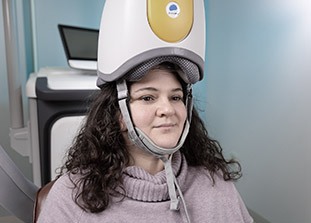Overcoming Obsessive Compulsive Behaviors
Obsessive Compulsive Disorder affects about 1 in 40 adults and 1 in 100 children in the United States. It is most prevalent among adults 18-44 years old and usually becomes present around age 19. Compassion Mental Health offers patients in Western Pennsylvania and Eastern Ohio effective treatment for OCD including non-invasive Transcranial Magnetic Stimulation.
Obsessive Compulsive Disorder:
A Definition
Obsessive Compulsive Disorder is a common health disorder characterized by patterns of undesirable thoughts or obsessions that often lead to repetitive behavior. These compulsive actions are normally harmless but can become very time consuming and distressing once the need to fulfill the urges surpasses other personal responsibilities like employment, family relationships, or quality of life.
Obsessions are intrusive, irrational thoughts or impulses that repeatedly occur. People with these disorders know these thoughts are irrational but are afraid that somehow they might be true. These thoughts and impulses are upsetting, and people may try to ignore or suppress them.
Examples of obsessions include:
- Thoughts about harming or having harmed someone
- Doubts about having done something right, like turning off the stove or locking a door
- Unpleasant sexual images
- Fears of saying or shouting inappropriate things in public
Compulsions are repetitive acts that temporarily relieve the stress brought on by an obsession. People with these disorders know that these rituals don’t make sense but feel they must perform them to relieve the anxiety and, in some cases, to prevent something bad from happening. Like obsessions, people may try not to perform compulsive acts but feel forced to do so to relieve anxiety.
Examples of compulsions include:
- Hand washing due to a fear of germs
- Counting and recounting money because a person is can’t be sure they added correctly
- Checking to see if a door is locked or the stove is off
- “Mental checking” that goes with intrusive thoughts is also a form of compulsion
Services Available for OCD
Frequently Asked Questions
If you have any additional questions on OCD please request to speak with a clinician.





